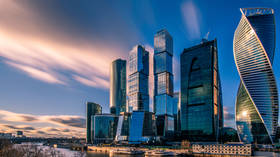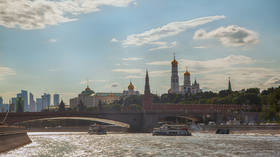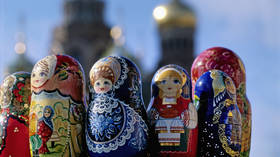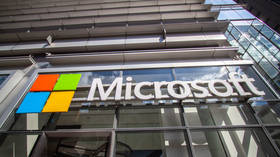The West's futile folly: Why sanctions against Russia haven't worked in the past and they won't work in the future

The Russian economy is currently experiencing unprecedented pressure from a group of countries led by the United States, with more than 10,000 sanctions imposed on the country, its citizens, and companies.
Never before has such a volume of penalties been imposed on any one country. Even Iran, which has been the West’s geopolitical punching bag for many years now, is "only" subject to about 3,600.
Sanctions pressure on Russia has been growing since 2014, when key sectors of the economy – energy, the military-industrial complex, and the financial sector – were targeted. Since then, the country’s citizens have learned to distinguish between the dire predictions associated with sanctions and the tangible results of their implementation. While, in 2015, about 60% of Russians didn’t believe sanctions had any impact on their lives, by 2020, almost 90% said they felt no effects. In short, people adjusted and became accustomed to the threats. Unemployment didn’t grow and even sat at historically low levels. Low inflation made many banking products such as consumer loans and mortgages affordable, helping to fuel a real estate boom in some parts of the country.
According to the Russian authorities, while the country lost about $50 billion as a result of the sanctions, it was able to compensate for this. “I don’t care about them, about these sanctions,” President Vladimir Putin said in an interview with Russian media in March of 2020. This sentiment was shared by the Russian people. Western restrictions did not affect either the lives of the country’s citizens or the approval ratings of its leaders. On the contrary, confidence in the country’s president strengthened. Western political scientists have observed that the introduction of sanctions against Russia has only led to the well-studied ‘rally round the flag’ effect, where external pressure only encourages the resolve of a country’s citizens to rally around their leader.
The restrictions introduced over the past four months have been much tougher and more extensive. The sanctions list includes not only legal entities and individuals, but also the state, as an institution, represented by its president, prime minister, and heads of ministries. Meanwhile, pressure from the West’s endemic ‘cancel culture’ has driven foreign companies out of the Russian market in droves, from oil and finance companies to retail chains and recruitment agencies.
Broad measures are also being taken to remove every trace of Russia from global sports, culture, and even history. Russians have the feeling that the West is trying to subject them to maximum pain by erasing their past, complicating the present, and darkening the future.
The official explanation for this policy is that the measures are being taken to change Russia’s foreign policy. While Western politicians periodically emphasize that the sanctions are not directed against the Russian people themselves, most ordinary folk see this duplicitous rhetoric as bunk.
Oleg, a student at a Moscow university, notes: “After all, if the actual purpose of the sanctions is to set Russia’s economic development back decades, that means the welfare of ordinary Russians will suffer along with it.”
Western countries are doing all they can to try to weaken the ruble, increase inflation, break logistics chains, and create a shortage of consumer goods in order to bring discomfort to Russia’s inhabitants and create social tension.
The sanctions that have been imposed are already all-encompassing, affecting not only individual sectors, but the country’s entire economy, so it is not surprising that the number of those affected by them today has grown. In March, the Russian Public Opinion Research Center investigated the impact of sanctions on the daily lives of Russians and concluded that half of the population is opting to purchase cheaper goods in place of more expensive ones or plans to do so, while one in five have abandoned projects such as apartment renovations, relocations, or educational courses. As a result, the majority of Russians – some 60% – said that the sanctions had somehow affected their lives.
An outside observer, unfamiliar with how things work here, might well assume that this figure speaks not only about the impact of sanctions, but also indicates a growth in political risks, as well as the likelihood of protests. However, even according to estimates from Western-funded research centers, the proportion of the Russian population that believes the country is definitely going ‘in the right direction’ has remained steady at 65-70% over the past few months. These are very high indicators.
The leaders of many ‘successful democracies’ in the West, which have demonstrated positive economic growth despite losing post-crisis momentum, could envy such a degree of trust. For example, US President Joe Biden’s approval rating is only 36% and continues to sink, with the bottom nowhere in sight.
By hoping to incite ordinary Russians to take to the streets with the help of sanctions and the exodus of Western companies, the West simply does not understand, firstly, the structure of the country’s economy, and, secondly, what the Russian people see as the reasons behind the recent events in Ukraine, or who they consider responsible for them.
More than 60 million people, that is, over half of the country’s adult population, including retirees, are economically dependent on the state in one way or another. Almost none of the civil servants, law enforcement officers, military personnel, doctors, or teachers who ‘work for the state’ are ready to heed calls from the West to quit their government jobs in protest over the events in Ukraine.
Roman, an employee of a state bank, who entered his field a little less than 20 years ago, says his income had grown steadily until February of this year. Of course, financial opportunities had decreased since 2014, when the first round of Western sanctions were levied and the value of the ruble plummeted after the reunion with Crimea, but stability has remained.
“No one would claim that the situation is simple, given that the bank in which I work has been sanctioned. But there is no question of laying off new hires, or those who have been working in the company for a long time. The same applies to salaries. There’s probably little hope of getting a raise in the near future, but cuts in monthly salaries and bonuses are not expected yet,” Roman says.
In a situation like this, it is obvious that work at state-related enterprises offers much greater stability than employment with European or American companies, many of which have their left employees completely in the dark about their future.
“I came to the office for the last time on March 4. I’ve been working from home for almost three months now, although it’s difficult to call it work,” says Anna, an employee of a large European manufacturer of household goods. “True, my salary continues to be paid, though not in full, and there’s almost no work – sending documents to the post office, holding Zoom meetings with other employees, and so on. But, most of all, I fear the unknown. You know that any day the staff may be terminated once and for all, and I will be out of a job. It’s a shame to build a career for so many years, working my way up from a simple salesperson to the head of a department, and understand that we will probably either have to start from scratch or face fierce competition when we are all finally thrown out into the labor market.”
According to analysts, not even the largest companies can afford to maintain staff much longer than three months. Many companies have already started to sell their businesses in Russia, realizing that they can no longer afford to remain in a state of limbo.
Some large Western companies in the financial sector have offered their employees three months of retraining with further employment opportunities abroad. However, given the attitude towards Russians in the Western labor market, many people don’t see this as a viable option.
“They promise to pay my salary in full for the next 6 months. They’ve sent us to Dubai for an unpaid internship. When it ends, those who show the best results will be recommended for transfer to the company’s offices around the world,” explained a different Anna, an employee of an American financial services company that has wrapped up its operations in Russia. “But what can I do? I have to try. It’s difficult to find a new job in the banking sector in Russia. Banks aren’t laying people off, but they’re not hiring either. They have introduced, as my friends at recruitment agencies say, a ‘hiring freeze’. My husband had to quit his job to come with me. I’ve always been the family’s principal breadwinner. Well, ‘sink or swim’, as they say. Either I’ll continue working abroad, or we’ll both return to Russia, but both of us will be out of work.”
Indeed, the restrictions against Russia have inflicted the greatest pain on the best educated and highest-earning strata of the country’s population – residents of large cities whose lives were more dependent on imported goods, trips abroad, etc. Therefore, these are the people who have most acutely felt the refusal of Visa or Mastercard to serve Russian clients, and the departure of well-known retailers. But these ‘losses’ are not critical, and the government is doing everything it can to make up for the inconveniences that have arisen through parallel imports.
The poorer segment of the population, which, according to some unofficial estimates, makes up almost a quarter of the country’s inhabitants, is less dependent on imports and suffers much less from this cancel culture.
Many people understand that, as in 2020, the reasons for the current economic difficulties are primarily external, and, secondly, unrelated to negative economic or market forces. That is, the difficulties have not arisen due to failures in the nation’s financial markets or the consequences of domestic economic cycles. In 2020, Russia faced a forced shutdown of business and public life due to the Covid-19 pandemic. Today, the country is being attacked by the leading economic centers of the world for dealing with, as experts say, geopolitical risks.
Support for the government’s policy is not engendered by economic factors, but rather an understanding that the conflict happening today is not so much between Russia and Ukraine, as between Russia and the so-called ‘Western World’. Many feel that sanctions would have been imposed on Russia regardless of its behavior, because the West “wants to weaken Russia.” This strong belief, which has been expressed more than once by President Putin, is largely based on distrust of US foreign policy. Sociologists have been recording such distrust since the late 1990s, when NATO began to expand to the east.
In the early 1990s, after the collapse of the USSR, there was great enthusiasm in Russia for strengthening relations with the United States. Many Russians believed that with the Iron Curtain a thing of the past, the two countries and their peoples would become strategic partners and reliable friends.
Sadly this partnership and friendship never materialized. Hopes were replaced by disappointment and distrust, especially after NATO illegally bombed Yugoslavia and the US launched wars in the Middle East and withdrew from weapons control treaties. The negative attitude towards US foreign policy strengthened after 2014, when a coup took place in Ukraine, with clear American support.
Since then, the harsher the confrontation between Russia and the United States has become, the higher Putin’s approval rating has risen.
That said, Russian society is convinced that the president is directing his foreign policy not for political support, but for the sake of state security. With this in mind, economic difficulties can be endured.
Understanding that Russians are willing to ‘tighten their belts’, the government is not afraid to admit that there are hardships ahead. Prime Minister Mikhail Mishustin stated that Russia’s economy is in the “most difficult situation in the last 30 years.” According to the Central Bank, the crisis of 2022 is one of the most significant challenges the Russian economy has faced since the 1990s.
The country is anticipating an up to 10% decline in GDP in 2022, and economists estimate it will take 5-6 years of two-percent annual growth for the economy to return to 2021 levels. And this growth is by no means guaranteed. Economists are afraid that inflation may reach 15-20% by the end of this year, while unemployment will peak at 8%. However, the public sector will be the most protected from employment cuts. Russians’ real disposable incomes will fall by 7-8% before returning to their current levels.
However, Peter, a 35-year-old employee of an IT company, has not lost optimism and is trying to comprehensively assess the situation: “Russia is conducting a Special Operation to guarantee physical security. Sanctions are a great reason to strengthen economic security. Now, Russia has a unique historic opportunity to develop its own industries and agriculture. The country can already provide itself with grain, vegetable oil, fish, meat, and potatoes. With the sanctions, the country will only become stronger in the future.”
In fact, the sanctions in force today, including those on transport and logistics, have had a greater impact on Russian imports than exports. Imports are declining in both physical and monetary terms. Taking into account the currency control measures currently in place, including the requirement that exporters sell part of their foreign exchange earnings, the prevailing market situation of exports outpacing imports is directly contributing to a strengthening of the ruble.
The exchange rate of the ruble against the dollar reached lows on March 9 at more than 136 rubles to the dollar. Since then, the national currency has strengthened by more than 100%. Due to a ban on exporting dollar and euro banknotes to Russia, a discrepancy between non-cash and cash exchange rates has arisen. A cash dollar or euro is traded at a premium of 15-17% to the non-cash rate. But it is important to note that both exchange rates have shown the same strengthening trend since March.
The adoption of currency controls has played an important role in reducing panic in the markets and among the population, which boosted confidence in the Russian economy’s safety margin and lowered prices for some imported goods and services. The president’s decision to require European countries to pay for gas in rubles has also been an important factor in propping up demand for the ruble.
There are people who directly benefit from this strengthening, namely tourists. Ilya, a 42-year-old employee of a construction company, was pleased to note the reduced prices at his favorite foreign vacation destination: “There are four people in our family. We looked at prices for a trip to Turkey in March, but it was very expensive, and we didn’t go. However, the strengthening of the ruble has made a vacation by the sea affordable for our family this summer.”
Of course, the country still has a lot of work to do to adapt to the new conditions, but there is an understanding in society as to why this situation has arisen. And in a world of high uncertainty, a consensus on basic issues is already a good platform from which to launch new initiatives.

















